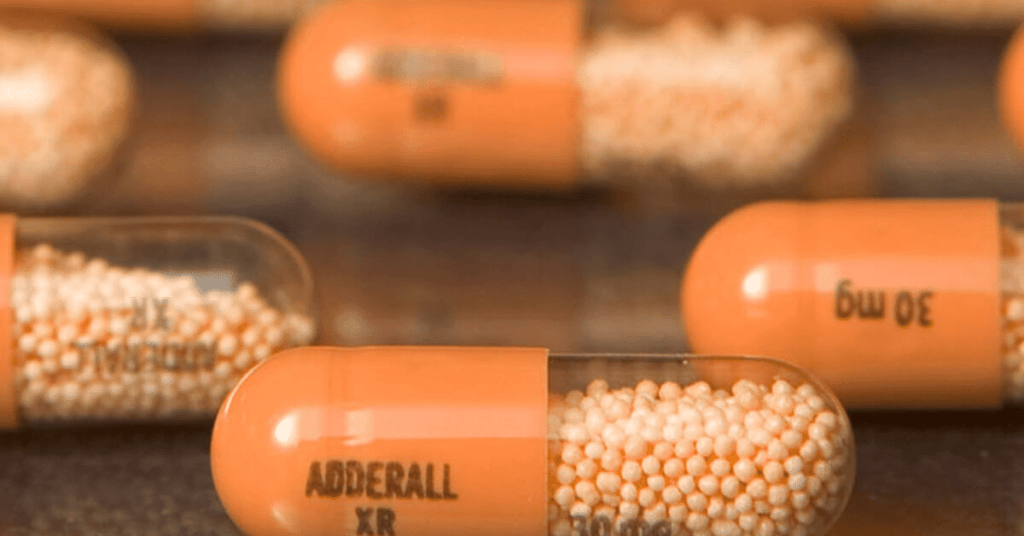Contents
- 1 What Is Amphetamine (Adderall)?
- 2 How To Take Amphetamine (Adderall)?
- 3 How Does Amphetamine Affect the Brain?
- 4 How Does Amphetamine(Adderall) Help ADHD?
- 5 Side Effects Of Amphetamine (Adderall)
- 6 How To Use Amphetamine (Adderall)?
- 7 Amphetamine (Adderall) Overdose Symptoms
- 8 Alternatives To Amphetamines For ADHD Treatment
- 9 What Should I Know Before Taking Amphetamine?
- 10 Medicines That Amphetamine May Interact With?
- 11 Who Should Not Take Amphetamine (Adderall)?
- 12 What Should I Avoid While Taking Amphetamine?
- 13 Conclusion
What Is Amphetamine (Adderall)?
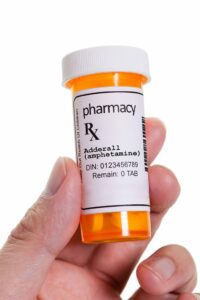 Amphetamine is a psychostimulant medication. It is often referred to as the drug of choice because it has been found to be effective in managing ADHD and narcolepsy. The chemical name for amphetamine is alpha-methylphenethylamine. Amphetamine causes a release of dopamine from nerve cells in the brain. This causes a feeling of increased alertness and wakefulness. Although there are many different types of amphetamines. Adderall is one of the most common for treating ADHD and narcolepsy patients. It has a lot of side effects including insomnia, dizziness, headaches, and weight loss.
Amphetamine is a psychostimulant medication. It is often referred to as the drug of choice because it has been found to be effective in managing ADHD and narcolepsy. The chemical name for amphetamine is alpha-methylphenethylamine. Amphetamine causes a release of dopamine from nerve cells in the brain. This causes a feeling of increased alertness and wakefulness. Although there are many different types of amphetamines. Adderall is one of the most common for treating ADHD and narcolepsy patients. It has a lot of side effects including insomnia, dizziness, headaches, and weight loss.
Amphetamine is a drug that has been used for many years. It was first discovered in 1887 and was originally used as a nasal decongestant. Today it is most commonly prescribed for ADHD and narcolepsy patients, although there are also other uses. There are many different types of amphetamines available, but the most well-known would be Adderall.
How To Take Amphetamine (Adderall)?
1) Generally start with a small dose and increase gradually (every 3 to 7 days), depending on how you respond
2) Take early in the morning, no later than 9 a.m.
3) Amphetamine is a short-acting medication and generally takes effect within 1 hour and lasts up to 3 hours
How Does Amphetamine Affect the Brain?
Amphetamine works by changing the amounts of certain natural substances in the brain.
1) Dopamine is increased, leading to better ability to focus attention and reducing impulsiveness
2) Norepinephrine level rises, leading to improvements in alertness and wakefulness
3) Does not affect serotonin, which contributes to its lack of effect on mood
How Does Amphetamine(Adderall) Help ADHD?

Amphetamine is a stimulant and acts as a central nervous system (CNS) stimulant which increases the activity of the brain and nerves. Children with ADHD have trouble concentrating because certain chemicals in their brains are not working properly or they are missing completely. These chemicals are called neurotransmitters. During times of stress, the brain releases high levels of these chemicals, which can lead to ADHD symptoms such as inattention and hyperactivity. Amphetamine works by increasing the amount of dopamine and norepinephrine (chemicals that carry messages between nerve cells). By increasing these chemicals, amphetamine-like drugs improve ADHD symptoms.
Amphetamine is the drug of choice for ADHD. It affects chemicals in the brain and nerves that contribute to hyperactivity and impulse control. The medicine is not a cure for ADHD, but it can help manage the symptoms of this condition.
Amphetamine comes as a tablet or extended-release (long-acting) capsule to take by mouth. A patient can usually take these two to four times a day, with or without food.
Side Effects Of Amphetamine (Adderall)
Common side effects include-
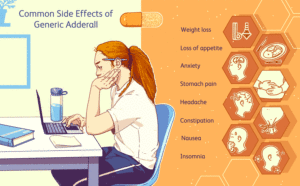
- Appetite loss
- Mental confusion
- Dry mouth
- Dilated pupils
- Decreased blood pressure upon standing up quickly
- Headache
- Dizziness or drowsiness
- Constipation or diarrhea
- Stiff muscles or muscle twitches
- Irritability
In rare cases, it can lead to dependence and tolerance (needing to take larger and/or more frequent doses in order to achieve the same effects). Used improperly or abused, it can lead to overdose and death. Amphetamine is a central nervous system stimulant drug. This means that it speeds up various mental and physical functions in the body. It may cause serious side effects, such as high blood pressure, heart failure, stroke, and liver toxicity.
How To Use Amphetamine (Adderall)?
Amphetamine is available in various forms with the most common being the pill, tablet, or capsule. The duration of effect can last from four to six hours. It is usually taken anywhere between once a day – three times a day.
“Adderall” is the most commonly used brand name of amphetamine. It is a blend of four salts – two of dextroamphetamine and two of levoamphetamine or l-amphetamine. There are several other brands that contain just one salt, such as Dexedrine (dextroamphetamine sulfate), Dextrostat (dextroamphetamine), or Focalin (dexmethylphenidate).
Amphetamine (Adderall) Overdose Symptoms
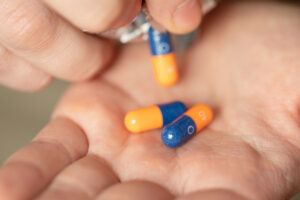 Symptoms include:
Symptoms include:
1) fast or pounding heartbeat
2) chest pain and shortness of breath
3) nausea, vomiting, stomach pain, and diarrhea
4) headache, dizziness, confusion, agitation, hallucinations, and feeling restless or nervous
5) increased blood pressure and body temperature
6) muscle twitches, seizure (convulsions), coma, or death
Alternatives To Amphetamines For ADHD Treatment
The long-acting form of methylphenidate, known as “Concerta,” is an effective alternative. However, there are other stimulants such as tricyclic antidepressants (amoxapine, nortriptyline), atypical antipsychotics (aripiprazole, olanzapine), and small molecules (guanfacine, clonidine) which can be used to treat ADHD. There are a number of non-stimulant drugs such as modafinil for narcolepsy treatment. That is more of a wakefulness-promoting agent than a classic amphetamine.
For long-term treatment: The stimulants methylphenidate and dextroamphetamine, and non-stimulant atomoxetine, have all been FDA approved for long-term treatment in children.
For short term treatment: Stimulants generally come in three formulations: the short-acting form (sugar-coated pills that dissolve in less than 30 minutes), intermediate release (capsules, which last 2 to 4 hours), and long-acting (a capsule either egg-shaped or flat with a core of beads; it can last up to 12 hours). The stimulants dextroamphetamine and dexmethylphenidate (Focalin) come in short-acting forms. Depending on the student’s needs, a doctor might recommend using several short-acting medications throughout the day or just one long-acting medication at bedtime.
What Should I Know Before Taking Amphetamine?
Amphetamine is a central nervous system stimulant that is used to treat ADHD and narcolepsy. It can cause serious side effects, such as high blood pressure, heart failure, stroke, and liver toxicity. It is not for everyone, and you should avoid taking it if you have a history of drug abuse. You should also consult with your doctor before taking it if you have high blood pressure, suffer from glaucoma, or are at risk for heart disease.
Your doctor will be able to determine if it is safe for you.
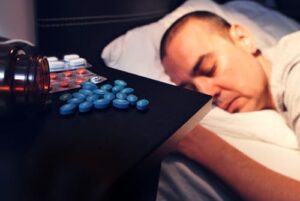
Side effects:
1) Headache, dizziness, and nervousness
2) Dry mouth and loss of appetite
3) Weight loss
4) Elevated body temperature, irregular heartbeats, and seizures
Medicines That Amphetamine May Interact With?
Amphetamine may interact with:
1) Levodopa: Decreased levodopa effect
2) Monoamine oxidase inhibitors: Interferes with the metabolism of amphetamine and tyramine, increasing the risk of a hypertensive episode
3) Alcohol: Increases CNS depressant effects such as drowsiness and sedation
4) Antipsychotics: Increases risk for neurotoxic psychosis, especially when used with other drugs that cause elevated body temperature or increase CNS depression such as TCAs or benzodiazepines
5) Antidepressants: Increases risk for serotonin syndrome, including the dilated pupil, shivering, sweating, myoclonus
6) Drugs used for migraine headache: Increases risk of serotonin syndrome and neuroleptic malignant syndrome, including hyperthermia and rigidity-not effective treatment for migraine headaches
Who Should Not Take Amphetamine (Adderall)?
Amphetamine is not for everyone. If you have high blood pressure, suffer from glaucoma, or are at risk for heart disease, it may be unsafe to use. You should also avoid taking it if you have a history of drug abuse.
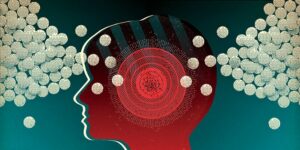
DO NOT TAKE IT IF YOU:
- Are pregnant or plan to become pregnant
- Have heart problems, high blood pressure, glaucoma, and thyroid problems
- Have difficulty urinating due to an enlarged prostate gland
- Are taking a monoamine oxidase inhibitor (MAOI) or within 14 days of stopping the MAOI medicine
- Have a history of drug abuse
People who take amphetamine should not use certain recreational drugs called “amphetamines” such as ecstasy, crystal meth, or methcathinone. It is important to tell your physician about all other medications you are taking, including over-the-counter medicines, vitamins, and herbal supplements.
Some examples of these drugs include
1) Caffeine (found in coffee, soda, tea), chocolate, cold & cough medicines
2) Pseudoephedrine (Sudafed), decongestants
3) Tricyclic antidepressants such as amitriptyline (Elavil) and nortriptyline (Pamelor), which can cause unwanted heart effects by increasing levels of norepinephrine
Don’t take other medicines without first discussing them with your doctor. This includes prescription or nonprescription (over-the-counter [OTC]) medicines and herbal or vitamin supplements.
What Should I Avoid While Taking Amphetamine?
You should avoid drinking fruit juices or taking vitamin C while taking amphetamine because these could decrease the drug’s effectiveness.
Amphetamine can cause sleeplessness, so don’t take it too close to bedtime.
- Don’t change the number of tablets you take or stop taking them without checking with your doctor.
- Do not suddenly stop taking this medicine because serious side effects could occur.
Conclusion
Amphetamine is a medication that should be prescribed by your physician. It affects chemicals in the brain and nerves, which can lead to improvements in ADHD symptoms such as hyperactivity and impulse control. Amphetamine comes as a tablet or extended-release (long-acting) capsule to take by mouth, with dosages typically taken two times per day without food. Adderall may also affect certain drugs you are taking for other conditions so it’s important to talk with your doctor about all medications before beginning treatment.
If you are looking for affordable Online Counseling MantraCare can help: Book a trial therapy session
